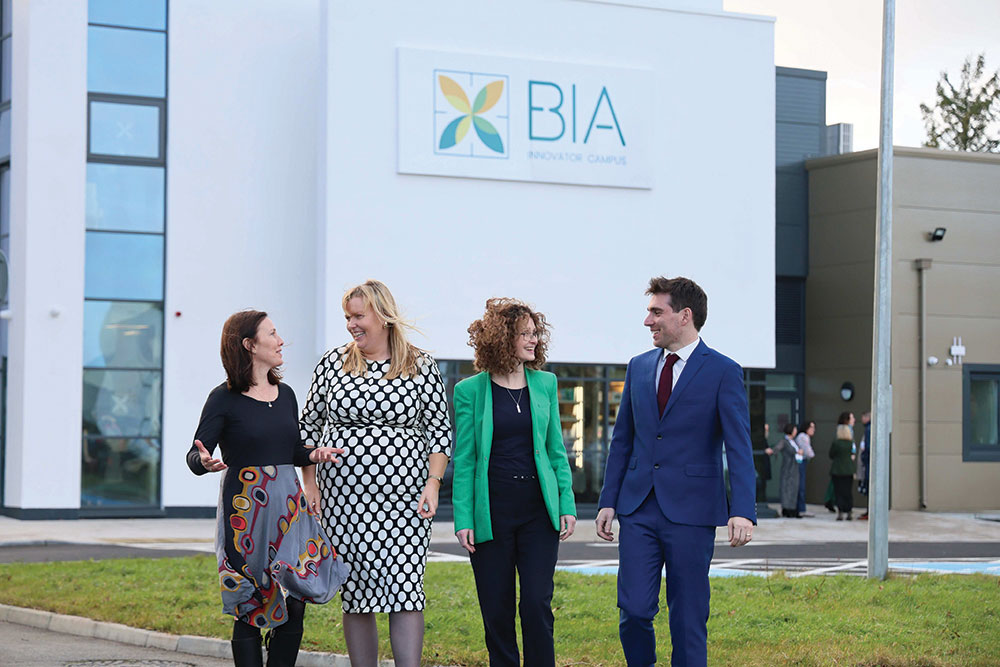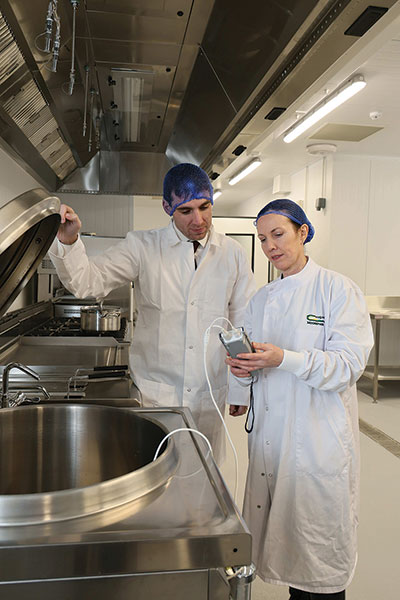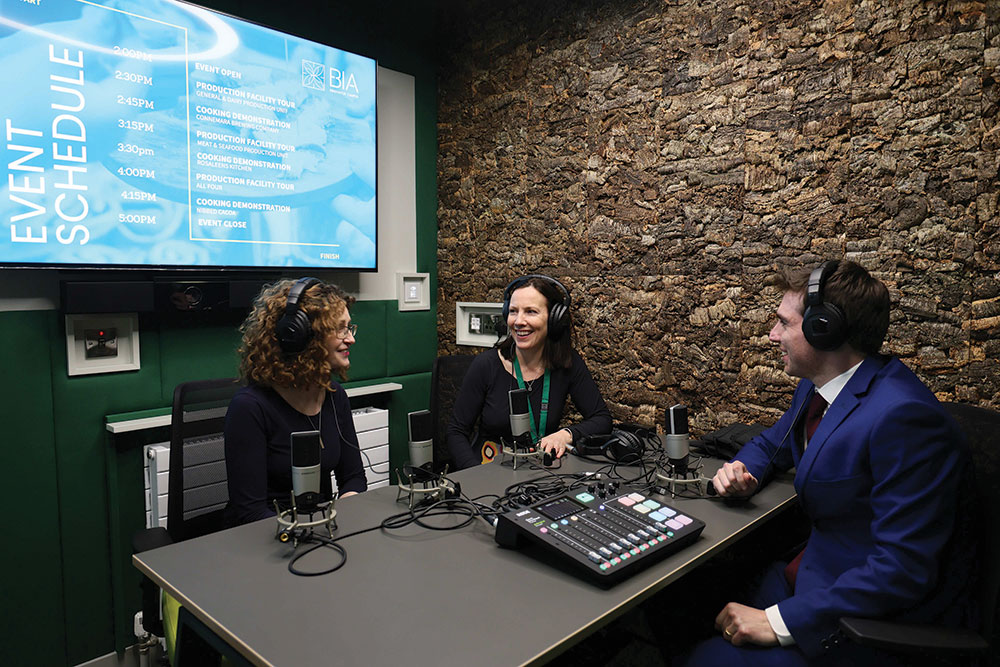01 March 2024
Destination: Innovation
The newly opened BIA Innovator Campus at Teagasc Athenry offers a unique single-location centre for food innovation and development in Ireland. To learn more about BIA’s exciting new offering, TResearch spoke to its core team: General Manager Elaine Donohue, Food Technologists Colm Foley and Anita Furey, and Head of Department for Food Industry Development Ciara McDonagh.

The core team at the official opening of the BIA Innovator Campus: (L-R) Anita Furey, Food Technologist; Elaine Donohue, General Manager; Ciara McDonagh, Head of Food Industry Development Department; Colm Foley, Food Technologist
What is the BIA Innovator Campus, and how did it come about?
Elaine: BIA is a new National Centre of Excellence at Teagasc Athenry. The Campus offers small food businesses a range of food-specific facilities, support, services and experiences from one central location. In 2017, a feasibility study established the need for a food innovation hub based in western Ireland with a regional and national reach. Since then, more than €8 million in capital funding has been raised with support from Enterprise Ireland, the Department of Rural and Community Development, Galway County Council, Teagasc, LEADER and the Western Development Commission to deliver a state-of-the-art campus.
What are your core priorities and objectives?
Anita: The objective is to provide a new food innovation and entrepreneurship ecosystem, closely linked to the Teagasc Food Programme with access to the research facilities and food pilot plants in Ashtown and Moorepark. BIA will provide state-of-the-art food production and training facilities, as well as knowledge resources needed for food start-ups and SMEs to become self-sufficient.
Colm: As part of the Food Industry Development Department within Teagasc, our priority is to support the growth of the food industry in Ireland. We work with all types of businesses, from start-ups and cottage industries, to companies scaling up with potential to export. BIA’s facilities are well suited to providing support to the artisan sector.
How do you plan to meet these objectives?
Anita: We offer an holistic approach to food innovation. The BIA campus offers a blend of practical workspaces, technical and business advice, knowledge transfer opportunities and links to wider food systems. As well as gaining deep insights into the food industry from the highly experienced team at BIA, it allows entrepreneurs to be part of a community, drawing on each other’s experience and insights.
Elaine: BIA will help food start-up and micro-businesses by giving them access to low-cost, low-commitment production facilities, and offering technical and commercial support. For existing small businesses, we can lease them high-spec, food-grade production facilities that will allow them to scale up and develop new products. For the farming community, BIA can help farmers develop off-farm income food projects and provide them with a variety of diversification ideas and supports. We also provide and facilitate a range of training and education programmes. Together, these components deliver a new ecosystem of food entrepreneurship that is truly unique in Ireland.
Colm: Alongside high-quality food production space, the Campus offers technical support from two onsite food technologists — myself and Anita. We can advise and troubleshoot on many areas that cause issues for new food businesses, such as producing a food safety plan, advising on packaging or equipment selection, and developing a recipe or formulation. This allows companies to grow and progress at a faster rate. There is a range of other support available such as business planning, marketing and commercial development.

Food Technologists Colm Foley and Anita Furey conducting new product testing in the food production units
What are the key facilities available on campus for food companies? Is there anything particularly innovative or ground-breaking you can share?
Elaine: The campus spans over 29,000 square feet across three buildings. There are four food-grade production units that are available for hourly or daily rental, and 12 own-door units that can be leased. In addition to these workspaces, the campus also comprises a 60-seat auditorium with demonstration space, a 14-station Culinary Training Centre, 12 hot-desks, a showcase room and a range of meeting rooms.
Colm: We offer state-of-the-art-food production units for four key areas of production: dairy, butchery/meat, seafood, and general production. These units are fitted with the necessary equipment and services. The pay-per-use model reduces the risk to food business operators and allows for multiple companies to benefit from the facilities. The units are also used for running development trials and training workshops. My favourite element of the campus is the auditorium, which has a demonstration station with a full audio-visual set-up allowing for recording and live streaming.
Anita: All units are designed to operate in a safe and hygienic environment to de-risk starting out in food business. Technical and business mentoring is available from our in-house experts. There’s also a hugely important community aspect to the campus as being an entrepreneur can be a lonely business.
What support do you provide for food companies?
Elaine: On the commercial side, our support involves mentoring, business planning, and assistance with grant funding. We have a well-established network across both private industry and state agencies and can provide signposting to service users. While support is currently available across a range of enterprise agencies, food technical specialists and education and knowledge providers, they must be accessed on a stand-alone individual basis. This makes BIA unique in that we bring it all together in one package.
Anita: As Food Technologists, Colm and I help existing food businesses and start-ups with any technological or scientific knowledge gaps — developing new products, compliance with food safety standards, product testing and analysis through laboratory testing and consumer panels. On a day-to-day basis, I support the shared co-working production units. I also develop and deliver training modules to food entrepreneurs and learners in the wider food industry.
How important is this initiative to the region?
Ciara: The BIA Innovator Campus will enhance the innovation and accelerate the growth of start-ups and existing food businesses operating in the Galway and Atlantic economic corridor. The newly opened incubation and production facilities, together with the commercial and technical support on offer, will be a game-changer for companies in the region and across Ireland.
Elaine: There is a dearth of food incubators and support in general for the grassroots food sector in Ireland. Much of the support available to the food industry is for companies already of some scale — not at BIA. We’re a broad church; it doesn’t matter if you’re a small farmer trying to develop off-farm income with a new food product, or a college student with a food business idea, you’ll get a warm welcome at BIA.
Colm: The west of Ireland was highlighted as having a lack of support services for food businesses. The region has many primary producers, and we can now assist them in creating value-added products from their high-quality raw materials. We want to create a diverse and energetic community where knowledge and ideas can be shared with ease. Once fully operational, there will be upwards of 40 food businesses operating from the Campus. Our location increases the catchment area for Teagasc technical services and training programmes, as producers no longer need to look elsewhere for this support.
Anita: As well as creating employment locally and providing incredible facilities in which to manufacture food safely, the BIA Innovator Campus also has a positive impact across the region and the island of Ireland: last year alone, we advised, trained and worked with food entrepreneurs from 28 of the 32 counties. We also worked with over 30 European partners to develop resources for our food community which are free to access and focus on all aspects of the agri-food industry.
Can you describe how your team will contribute to Teagasc, and vice versa? How does this fit in with wider Teagasc food industry development and networks in the region?
Ciara: In line with our own strategic goals, BIA will contribute to the national development of our most important indigenous sector, agri-food. The Teagasc link is key to the innovative nature of BIA. Client companies benefit not only from the expertise of our technologists, Colm and Anita, but they also have access to the wider support of the Teagasc Food Programme. This will accelerate technology transfer to the food industry, for small-scale, local and start-up food companies in particular.
Colm: As members of the Food Industry Development Department, Anita and I have access to the breadth and depth of knowledge and experience available within Teagasc. Our colleagues in Teagasc have always been obliging and a great support. In turn, we can guide producers towards the range of facilities and services available at the research centres in Ashtown and Moorepark.
What does the near future hold for your team?
Ciara: Sustainability is a key focus across the industry, regardless of company size or sector. It’s no longer a trend but a requirement for businesses to guarantee sales, growth and investment. We’re seeing an accelerating interest in sustainable packaging and the reduction of food waste and loss. Companies are looking at new technologies to extend shelf life and exploring how they can extract value from by-products and waste. A lot of these technologies are being applied and trialled by companies within the innovation facilities in Teagasc. Reformulation is another key priority for anyone producing food products, with companies being asked to reduce calorie content and the levels of saturated fat, sugar and salt in their products.
Anita: Sustainability, circular economy and climate change all require immediate action and directly impact the food industry. Adding value to food waste and underused foods at a community level to reduce food waste is an exciting area of the circular economy.
Elaine: Industry-wide, the overarching theme right now is sustainability. That extends all the way through the supply chain, from raw material to the finished goods on the consumer’s plate. Everyone in the industry needs to engineer their product or service to be more sustainable. There is also a lot going on around food tech and digitalisation and how existing and emerging technologies can improve and drive food production, distribution and supply.
Colm: We receive many queries from companies who wish to develop and reformulate products with specific nutritional and functional attributes, I believe this will continue in line with consumer dietary trends. Producers will also need to focus on recipe and production efficiencies to ensure they can continue to provide high quality products at an acceptable price point.

Among the Campus’s new features is a fully-equipped audio-visual room for livestreaming and podcast recording
What are the team’s values? What are the principles you work to that you think make your team successful?
Colm: The team at BIA is passionate about food and developing the food industry in the region. We are keen to offer support and growth potential to smaller operators. As we deal with many single-operator businesses, developing strong and supportive working relationships is a guiding principle; we feel as invested in their businesses as they are.
Anita: We all genuinely care and are passionate about food. Everyone on the team has invaluable experience in the food industry. Hard work, creativity and flexibility are at the heart of all that we do. I think what makes our team work effectively is the open communication, trust and respect we have for one another.
Elaine: Humility and passion! We understand the food business can be an intimidating place to early-stage entrepreneurs. We make sure all our service users get a warm welcome and are comfortable in coming to us for support. We’re all very flexible and willing to help each other out and do whatever is in the best interest of our service user.
What are you proudest of as a member of the team?
Ciara: I was brimming with pride at the official opening of the BIA Innovator Campus by An Taoiseach recently – it was so fulfilling to see what the team has achieved, and the hurdles overcome in bringing this multi-agency food ecosystem from concept to completion.
Colm: Playing even just a small part in the delivery of this Campus has been an immense source of pride for me, as it is a unique centre of excellence for the industry.
Elaine: I’m most proud of the work the team has done over the last two years, particularly in getting the build over the line and the campus fully operational.
Anita: I’m proud to be able use my scientific background to help food producers create new products and navigate through the myriad of food law requirements.
[pic credits] Photography: Mike Shaughnessy
